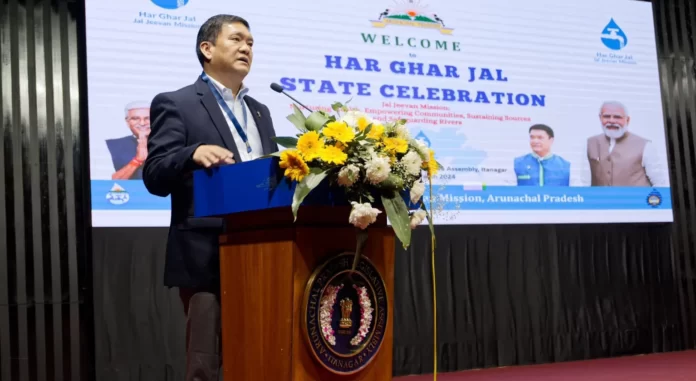Arunachal Pradesh, the northeastern frontier of India, has reached a significant milestone by achieving 100% implementation of the Jal Jeevan Mission (JJM). This remarkable feat not only underscores the state’s commitment to providing clean drinking water to its residents but also positions it as a trailblazer in the Northeast region.
The Jal Jeevan Mission, launched by the Government of India in 2019, aims to provide potable water to every rural household across the country. Access to clean water is essential for improving health outcomes, enhancing livelihood opportunities, and ensuring overall well-being, especially in rural areas where water scarcity and contamination are prevalent.
Arunachal Pradesh’s achievement of 100% JJM implementation is a testament to the concerted efforts of the state government, local authorities, and community participation. Through a combination of infrastructure development, capacity building, and innovative strategies, the state has successfully overcome the challenges posed by its rugged terrain and diverse topography to ensure universal access to safe drinking water.
One of the key factors contributing to Arunachal Pradesh’s success in JJM implementation is its emphasis on community engagement and participation. Recognizing the importance of involving local communities in decision-making processes, the state government has actively encouraged village-level committees to take ownership of water supply schemes, ensuring their sustainability and effectiveness.
Moreover, the state has leveraged technology and innovation to streamline the planning, implementation, and monitoring of JJM projects. The use of Geographic Information System (GIS) mapping, remote sensing, and mobile applications has enabled authorities to identify priority areas, assess water quality, and track progress in real-time, facilitating efficient project management and resource allocation.
Additionally, Arunachal Pradesh has prioritized the capacity building of its workforce, including engineers, technicians, and community volunteers, to ensure the effective operation and maintenance of water supply systems. Training programs, workshops, and skill development initiatives have been conducted to enhance technical expertise and empower local stakeholders to address challenges independently.
The successful implementation of JJM in Arunachal Pradesh is not only a reflection of effective governance but also a testament to the state’s resilience and determination to overcome geographical and logistical barriers. With its diverse landscape encompassing dense forests, mountainous terrain, and remote villages, the state faced unique challenges in extending water supply services to every household.
However, through innovative approaches such as rainwater harvesting, spring rejuvenation, and gravity-fed water supply systems, Arunachal Pradesh has been able to harness its natural resources and traditional wisdom to ensure water security for its residents. These sustainable practices not only mitigate the impact of climate change but also promote environmental conservation and resilience.
Furthermore, Arunachal Pradesh’s achievement of 100% JJM implementation sets a precedent for other states in the Northeast region to emulate. By sharing best practices, lessons learned, and success stories, the state can serve as a mentor and catalyst for accelerating progress towards universal access to clean water across the region.
As India marches towards the goal of ‘Har Ghar Jal’ (Water to Every Household) by 2024, Arunachal Pradesh’s accomplishment is a significant step forward in realizing this vision. The state’s unwavering commitment to ensuring the fundamental right to water for all its citizens is commendable and reflects the spirit of cooperative federalism and inclusive development.
However, despite the remarkable progress made, challenges remain in sustaining the gains achieved under JJM and addressing the needs of marginalized communities, particularly in remote and underserved areas. Continued investment in infrastructure, technology, and human resources, coupled with enhanced coordination between various stakeholders, will be critical in consolidating the gains and achieving long-term sustainability.
However, Arunachal Pradesh’s achievement of 100% JJM implementation is a momentous milestone that highlights the transformative power of collective action, innovation, and perseverance. By prioritizing water security and inclusive development, the state has not only improved the quality of life for its residents but also set a shining example for the rest of the country to follow. As the journey towards universal access to clean water continues, Arunachal Pradesh stands poised to lead the way towards a brighter, more sustainable future for all.



